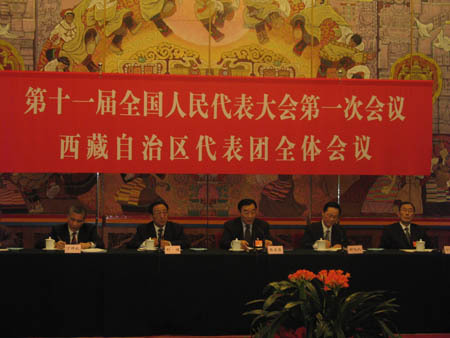"Thanks to the strong support of the Central Government, we have made much headway in social, economic and cultural fields in the past five years. Tibetan people are embarking on a development road with salient Chinese characteristics and special ethnic features," said Qiangba Puncog, President of the Tibet Autonomous Region, on March 7 during a delegation meeting of the first session of the 11th National People's Congress. The meeting was held to review the government budgets of 2007 and to deliberate the government budgets for 2008.
"Of every 10 yuan we spent, nine came from financial allocations by the central government and from aid from other parts of China," Qiangba Puncog told the domestic and foreign press during the meeting. Xie Xuren, Minister of Finance, was also present.
 Tibet Autonomous Region delegation hold a meeting on March 7, 2008.
Tibet Autonomous Region delegation hold a meeting on March 7, 2008.
Norbu Dunzhub, Mayor of Lhasa, said during the meeting that after the Qinghai-Tibet Railway began operating, the plateau city has seen a boom in tourism development. "Of 2007's financial revenue," the mayor said, "2.81 billion yuan (more than US$395 million) came from tourism industry."
However, Norbu Dunzhub also admitted that some problems still remained to be resolved. For instance, in the future, the Lhasa government will take measures to save energy and curb pollutant emissions in industries such as mining, power generation and pharmaceuticals. More efforts will be made to protect the wetlands on the upper reaches of the Lhasa River. The protection of ecological environment in tourist resorts is also high on the government's agenda.
"As the capital of the Tibet Autonomous Region, Lhasa enjoys many advantages for economic development. In the future, we will work hard to boost the mining industry, the processing of agricultural and husbandry products, Tibetan medicine manufacturing, architecture, and ethnic handcraft industries," said Norbu Dunzhub. "The construction of the Qinghai-Tibet Railway brings us a historical opportunity and we will cash in on this precious chance to take full advantage of Lhasa's abundant tourism resources."
Commissioner of Changdu prefectural government of Changdu, a city in the joining area of Tibet, Sichuan and Yunnan, said at the meeting that Changdu people are firmly opposed to secessionist activities. Changdu is dedicated to developing the local economy and improving the people's livelihoods.
In 2008, he suggested that the central government further improve several national highways: Nos. 317, 318 and 214. "Changdu is out of reach of the Qinghai-Tibet Railway", the commissioner said. "Therefore, there is an urgent need to link the city with the trunk railroad via convenient transportation facilities."
During the meeting he also suggested the Central Government put more efforts to exploit the copper mine at Yulong Mountain and to develop the rich hydraulic power in this region. The commissioner also hoped the government could include Changdu into the Shangri-la tourism zone and open it to tourists from home and overseas.
(China.org.cn by staff reporter Chen Xia, March 11, 2008)